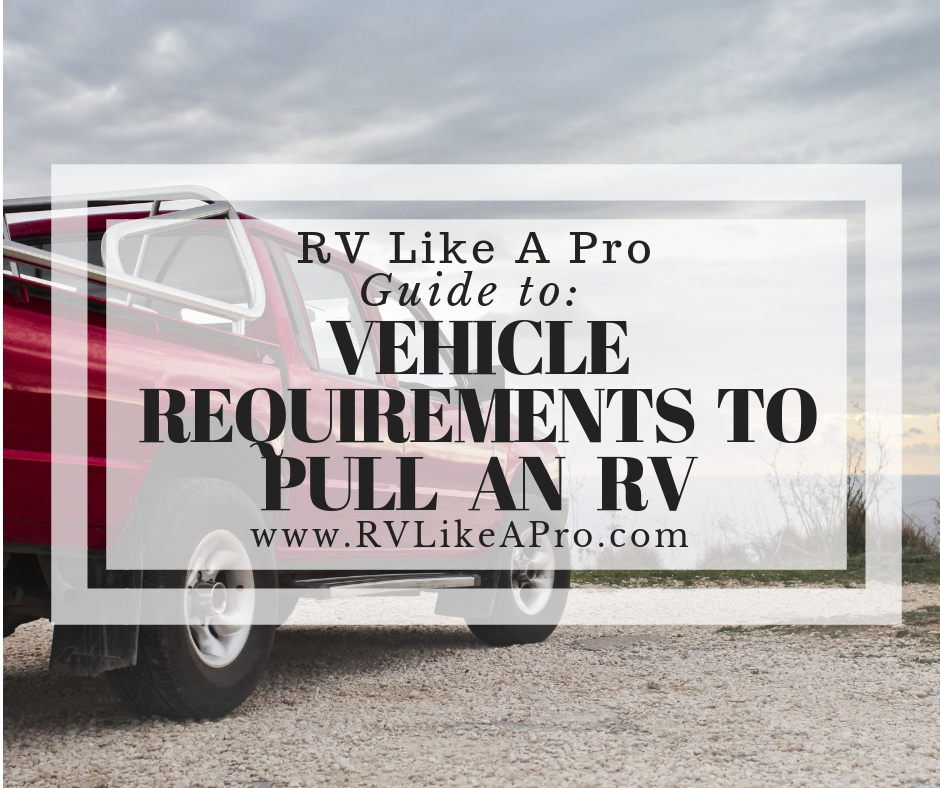
Vehicle Requirements to Pull an RV
What kind of vehicle do I need to pull a camper? This is one of the most common (and important) questions when someone is considering purchasing an RV. The vehicle that pulls an RV is called a “tow vehicle“. Tow vehicles vary in weight and size. You don’t need a 1 ton dually diesel truck to haul a camper. There are many people pulling campers with medium sized SUVs or even mini vans. That being said though it is very important that you do not overload a tow vehicle. Doing so could be very dangerous.
An overloaded tow vehicle can be very dangerous. Not only could you blow the engine of the tow vehicle you could loose total control of the vehicle and trailer which could result in a potentially fatal accident. Not uncommonly, a rollover.
Tow Capacity
The first term to understand in pulling a trailer is “tow capacity”. Tow capacity is simply how much weight a particular vehicle is rated to handle. More than half of the people that come in to buy a camper do not know how to find out what their vehicle can haul. The easiest way to research what your tow vehicle can all haul, is to Google it. Simply say: “What is the tow capacity of a 2004 Chevy Silverado 1500?” Or whatever tow vehicle you have. This will give you a good jumping-off spot. Keep in mind there are many variations to a particular vehicle that will effect it’s tow capacity. Factors such as: the gears in the vehicle’s transmission, the rear end, and what rear axle and leaf springs were installed in the vehicle. All of these will be deciding factors on what a vehicle’s tow capacity is. Because of this variation in individual vehicles it is really difficult to make a blanket statement of “this vehicle can pull this weight”.
To be 100% sure what weight you’re tow vehicle is capable of hauling get your VIN number off your dash and call your dealer, ask for service or parts. They should be able to look your vehicle up and tell you what the tow capacity is.
Keep in mind you don’t want to buy a trailer that is at the max of your tow capacity. You still have to add water, clothes, outdoor gear, lawn chairs, food and everything else to your camper. In addition you may be hauling firewood or extra stuff inside your tow vehicle. All of this will add weight to the trailer. I once had a couple that were rock hounds, they would haul back hundreds of pounds of rocks from wherever they traveled. They needed to keep this in mind while they were looking at campers.
An Equalizer hitch or weight distribution hitch will help your tow vehicle ride better and your camper travel better. But it doesn’t give your tow vehicle anymore weight capacity.
Tongue Weight
Tongue weight is another important term to familiarize yourself with before you start pulling a trailer. Tongue weight is the amount of force that the trailer is putting on the hitch of the vehicle. The general consensus among experts is that the tongue weight should be roughly 9 – 11% of the gross trailer weight. Gross trailer weight is the total weight of the fully loaded trailer.
If the tongue weight is too light (picture the trailer riding down the road at an upward angle) it could result in trailer sway. Trailer sway is exactly what it sounds like. The trailer starts swaying back and forth and could eventually cause total loss of control.
If the tongue weight is too high (picture the trailer riding down the road at a downward angle). This would put too much force on the back of the tow vehicle. This could cause “porpoising” and effect the steering of the tow vehicle. It could also result in the hitch failing. I have seen a vehicle that the hitch fell off due to rust and too much tongue weight.
Thankfully tongue weight is relatively easy to adjust with the kind of hitch you use. See our article here.
Other Vehicle Needs to Pull a Trailer
Brake Control
If an RV weighs more than three thousand pounds you’ll need a brake controller. A (good) RV dealer will not allow you to take your camper home without a brake controller if your camper is over 3000 lb. A brake control is a component that applies your campers brakes when you step on your vehicle’s brake pedal. It also has the ability to apply only the trailers brakes, usually with a little slide lever. A lot of newer vehicles, that were intended to haul heavy trailers, will have a brake control factory installed. Often though, it still requires fuses to be installed to operate. Some manufacturers of tow vehicles will not install the brake controller but will give you the pigtail wire harness so a brake control can be quickly installed into your fuse panel under your dashboard. If If you wondered what that little wire harness you received in your glove box was when you bought your vehicle, this was likely it.
There are a lot of aftermarket brake controls on the market. Your RV dealer can recommend a good one for you. Your RV dealer can also usually install a brake controller in your tow vehicle. I generally recommend the least complicated brake control. Simple is good with a brake controller.
There are some wireless models available however most are hardwired from your brake pedal and fuse box under the hood to your rear bumper and your seven round Trailer Connection.
Trailer Connections
There are several trailer connections that you may find on the back of your tow vehicle. The most common are “four flat” and “seven round”.
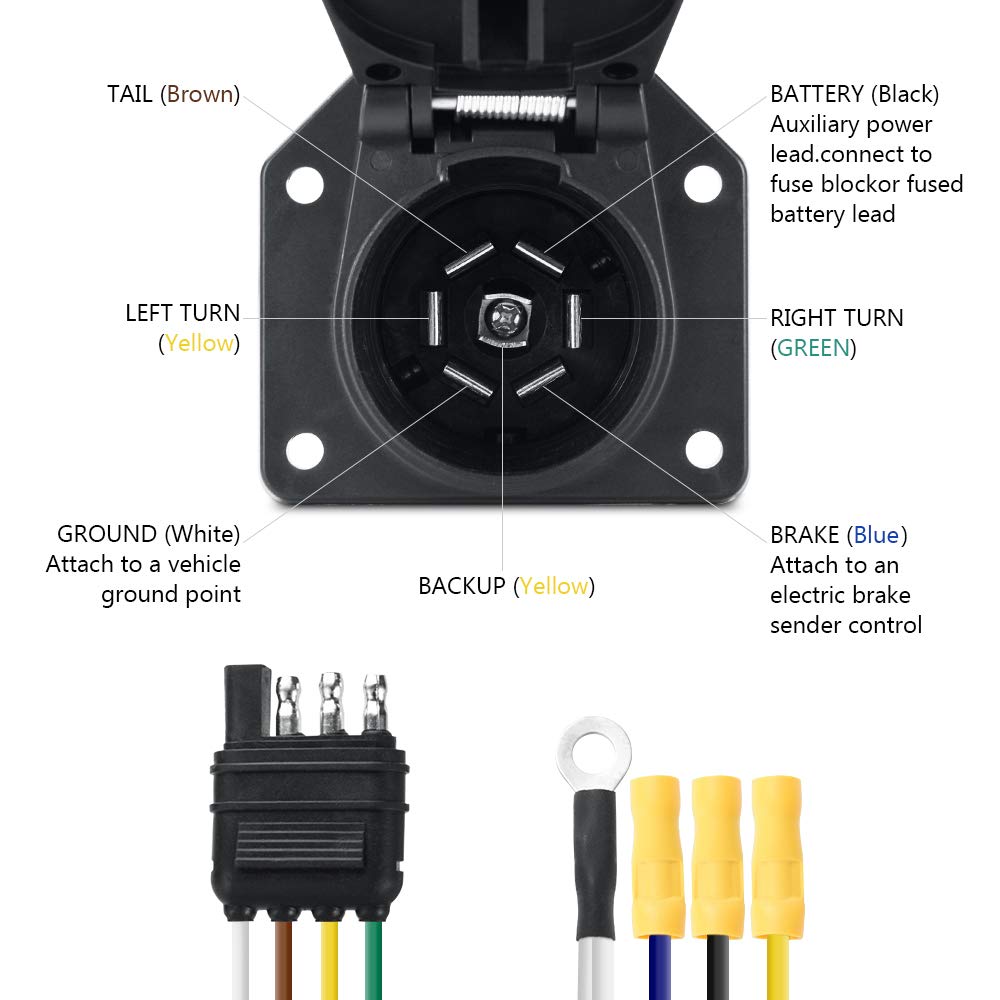
Four Flat
A “Four Flat” connection is for boat trailers, small snowmobile, or small cargo trailers. The wires it will have are: ground wire, running lights, left blinker, and right blinker.
Seven Round
A “Seven Round” connector is for campers or large trailers that have electric trailer brakes. This wiring harness has: a ground wire, left blinker, right blinker, running lights, charge line, trailer brake wire, and backup lights wire.
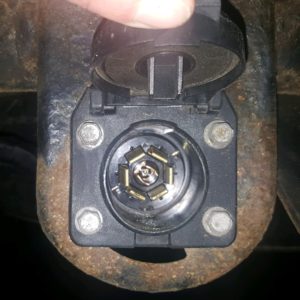
Not all trailers will use all the wires in this harness. Most campers don’t have backup lights so that wire is usually not used.
There are adapters so you can adapt your 4 flat to a 7 round.
Likewise there are adapters so you can adapt your 7 round to a 4 flat.
Trailer Hitch
It sounds very weird but you will need a receiver to put your trailer hitch in. I had a customer come in the other day, that didn’t have a receiver on their tow vehicle. This happens often enough that I’m mentioning it here.
For more information on what you will need to pick up your camper as well as more information on trailer hitches see our article here.
Happy camping!


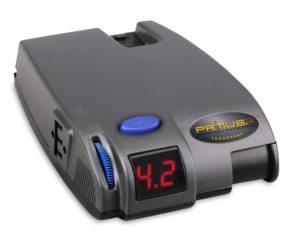
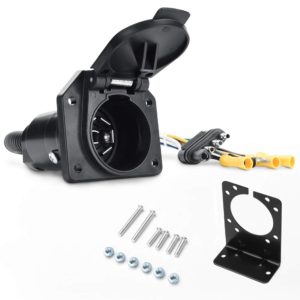
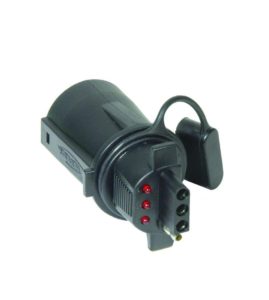
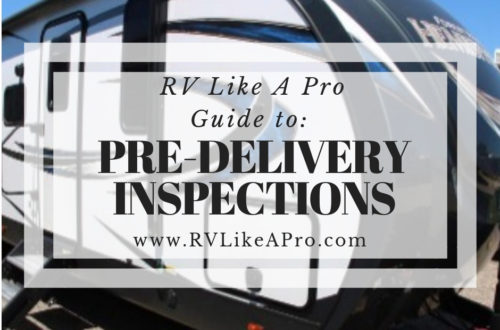
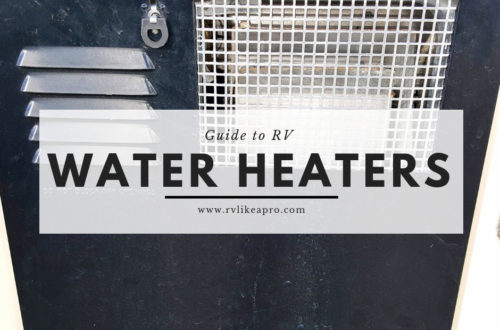
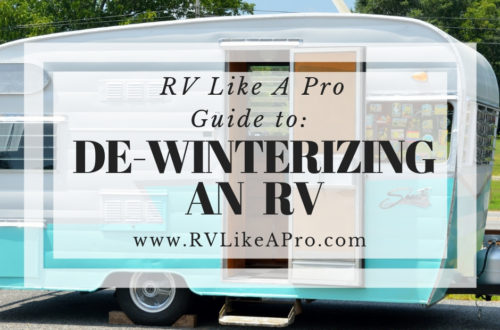
25 Comments
Holly Bird
It amazing how many people think they can tow an RV with a small car..I have seen so many little cars on the side of the road with a camper that is bigger than their vehicle! As always….You have the best advice!
Laurie
I sure hope someday I can take a trip like this! Very good article. Thank you!
Nikki
Thank you – thank you! We’ve been looking at trailers/Rvs and were just talking about all of this. We know how important all of this information is and you guys really know what your talking about.
Janice
Great information
Heather
Great information.
Tricia Snow
We have had an F350 to tow with that we finally had to get rid of. I loved it! But they are expensive to maintain. I think we will go to a 250 or 2500 model next time! These are great tips for anyone getting into an RV
Leigh Ann
All of these things are so important to safely enjoy your RV. Thanks for bringing them to our attention.
Meagan
Good advice!
Junell DuBois
Great resource for someone looking to take a vehicle with them on an RV trip
jen
ooooo important stuff right here! I’ve seen bad things happen to people who didn’t look this info up!
Michele
You guys always have the best tips and guidance! I know where to go if we decide on an RV in our empty-nesting!
Tiffany
I’ve seen some very tiny cars trying to pull trailers they probably shouldn’t be – they need to read this! Ha! Love all the tips – just found myself roaming FB marketplace looking at people selling RVs! Yikes!
Susan Franklin
You are such a great resource for all things RV! I’m glad we know where to do when we decide to take an RV trip!
Cindy
So much that one needs to know! Your blog is a great resource for RVers. I don’t have one but I’m learning so much. Who knows? I could be an TV owner in the future.
Lina
Great advice! My husband and I had been talking about getting a RV/ trailer and this is what I needed.
Suzan
A great resource for detailed information on RV’ing. Thanks for sharing this. It always amazes me when I see a compact car towing a camper!
Brittany
There is so much that goes into having an RV that I did not know about. Thanks for sharing! Great tips!
Katie
Great tips! We have a long and pretty heavy RV. Its been kind if hard finding the perfect vehicle to pull it with.
Pauline
Such good advice. Its silly when people think they can pull more than what their vehicle is capable of, the money for repairs is so not worth it.
Kim
I’m learning that there are so many things about RVs that I didnt know! This is a great resource!
Jennifer Morrison
I have never thought of most of this. The brake controller looks like it would be so valuable!
Carolina
We rented an RV a couple of years back and this post would of been so helpful since we didn’t know what we were doing. Thanks for all the info. I’m saving this post for our next RV trip!
T.M. Brown
Thank you once again for sharing your amazing expertise! If we ever get a truck again, this will be something to take into consideration.
Angela Greven | Mean Green Chef
Such great advice it should be required reading for people that are towing large loads! I’ve seen cars flipped with trailers behind them, a boat that rode up off the trailer and through the cab of a truck, bumpers pulled off of trucks. People do crazy things in FL! Thanks so much for sharing 😍
Annette
Fabulous tips as we all get ready for summertime travels. I can’t wait to get out and about!!!!